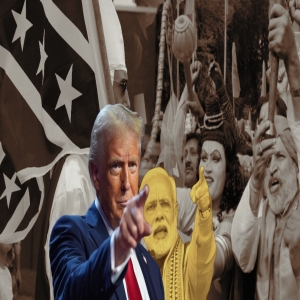
 Fr. Gaurav Nair
Fr. Gaurav Nair

Once, authoritarianism was dismissed as a relic of the 20th century or at least was a declining trend. Ironically, it has found a global resurgence in democracies themselves. The United States, which was long hailed as a beacon of democratic ideals, has, under Donald Trump's presidency, exemplified how authoritarian tactics—media manipulation, institutional erosion, and majoritarian polarisation—can be normalised even in mature democracies. This alarming trend not only weakens America's "moral" authority but also emboldens parallel forces in nations like India, where democratic foundations are already under siege.
Trump's playbook—marked by weaponising governance, purging dissenters from federal agencies, and undermining judicial independence—has demonstrated how swiftly democratic norms can unravel. His administration's embrace of policies favouring plutocrats mirrors strategies employed by Narendra Modi's regime, which has institutionalised Hindutva ideology and crony capitalism.
Worse, the normalisation of authoritarian governance in the US provides tacit justification for India's own democratic backsliding, even though India has been declining for more than a decade now. The co-opting of institutions like the Election Commission and judiciary, the muzzling of critical media, and the criminalisation of dissent through draconian laws reflect a troubling convergence. Such tactics have already eroded integrity and fuelled social fragmentation, leaving India vulnerable.
While Trump's withdrawal from climate accords and Modi's pursuit of ecologically disastrous projects like the Char Dham Yatras may placate short-term political bases, they jeopardise common goals and India's public health. With 13 of the world's 20 most polluted cities, India's lack of a coherent environmental policy.
For our country, revitalising institutional integrity is critical. An independent judiciary, a nonpartisan civil service, and a free press are non-negotiable. Repealing laws that criminalise dissent and restoring the autonomy of bodies like the Election Commission and Lokpal would signal a commitment to accountability. Economic policies must prioritise equity over cronyism. Redirecting resources toward education, healthcare, and green infrastructure can address much of the inequality. However, the first need of the hour is for the nation's top dogs to unequivocally reject communalistic tendencies and take harsh action against groups that are perpetrating it.
Internationally, we must align with democracies committed to multilateralism, distancing from transactional alliances that echo Trump's "deals over ideals" approach. Strengthening partnerships with the EU and ASEAN while advocating for fair trade practices can mitigate the fallout of US protectionism. Domestically, fostering civic education and grassroots movements to counter polarisation is essential. As history shows, authoritarianism thrives on apathy; a vigilant, informed citizenry remains democracy's best defence.
The normalisation of authoritarianism, buoyed by America's example, threatens to break apart even our country. We must resist this tide. The alternative is a future where majoritarianism and autocracy prevail—a betrayal of the vision that once made India and America exemplars of pluralistic democracy.